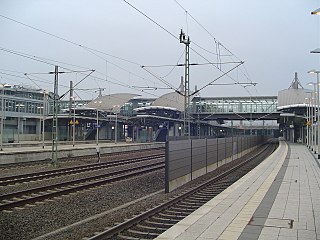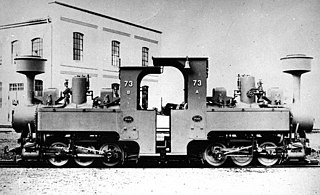
Swakopmund railway station (German : Bahnhof Swakopmund) is a railway station serving the town of Swakopmund in Namibia. It is part of the TransNamib railway network. Its IATA code is ZSZ. [1]

Swakopmund railway station (German : Bahnhof Swakopmund) is a railway station serving the town of Swakopmund in Namibia. It is part of the TransNamib railway network. Its IATA code is ZSZ. [1]
Swakopmund was the starting point of the first state railway line in German South West Africa. The railway station was built in 1901, as a terminal on the Imperial Germany's colonial Kaiserliche Eisenbahn line connecting Swakopmund with the capital Windhoek. [2] The station was designed by Willi Sander, who also later designed Swakopmund Lighthouse. [3] In 1914 the extension to Walvis Bay was completed, with a railtrack very close to the shore of the Atlantic Ocean. In 1980 this extension was replaced by an alternative route behind the dunes that allowed for higher axle load. [4]
The station building, declared a national monument in 1972, [5] today serves as a hotel and casino; [6] [7] nowadays trains stop further inland to the east of the original building. There is another former station building in Swakopmund, the O.M.E.G. Bahnhof of the private mining company Otavi Minen und Eisenbahn Gesellschaft , today housing a museum.

TransNamib Holdings Limited, commonly referred to as TransNamib, is a state-owned railway company in Namibia. Organised as a holding company, it provides both rail and road freight services, as well as passenger rail services. Its headquarters are in the country’s capital Windhoek.

Cologne/Bonn Airport station is a station at Cologne Bonn Airport in the German state of North Rhine-Westphalia. It was built as part of the Cologne–Frankfurt high-speed rail line and opened in June 2004 on the approximately 15-kilometre-long (9.3 mi) Cologne Airport loop line. It is served by Intercity-Express (ICE), Rhine-Ruhr S-Bahn and regional services.

Düsseldorf Airport is a railway station in Düsseldorf, Germany on the Cologne–Duisburg line that connects Düsseldorf Airport to Düsseldorf-Stadtmitte and long-distance trains, most of them ICE trains. Opened in May 2000, the new railway station has the capacity of 300 train departures per day.

Erfurt Hauptbahnhof (Erfurt Hbf) or Erfurt Central Station is the central railway station at Erfurt in Germany. It is an important junction on the German rail network, served by numerous local and long-distance rail services. Immediately north of the station is Erfurt's city centre. The station was used by approximately 12.5 million passengers in 2006, an average of about 34,000 per day. The station lies on the Thüringer Bahn, which connects Halle to Bebra. It is served also by the Erfurter Bahn.
The Otavi Mining and Railway Company was a railway and mining company in German South West Africa. It was founded on 6 April 1900 in Berlin with the Disconto-Gesellschaft and the South West Africa Company as major shareholders.

Windhoek railway station is a railway station serving the city of Windhoek, the capital of Namibia. It is an important station in the Namibian rail network, and it is run by TransNamib.

Walvis Bay railway station is a railway station serving the port city of Walvis Bay in Namibia. It is part of the TransNamib railway network.

Wilhelm Sander was a master architect and contractor working for Sander & Kock known for his work in German South West Africa, today's Namibia.

The South West African Zwillinge 0-6-0T of 1898 was a narrow gauge steam locomotive from the German South West Africa era.

Gütersloh Hauptbahnhof is the main railway station in Gütersloh in the German state of North Rhine-Westphalia. It is on the electrified, four-track main line from the Ruhr to Hanover, opened in 1847 as part of the trunk line of the former Cologne-Minden Railway Company. Services of the Warendorf Railway also run from Münster via Rheda-Wiedenbrück and the Hamm–Minden line to Gütersloh.

The rail service in Namibia is provided by TransNamib. The Namibian rail network consists of 2,687 km of tracks (2017).

Angermünde station is a transportation hub in the city of Angermünde in the northeast of the German state of Brandenburg. The station opened on 15 November 1842 on the Stettin Railway between Berlin and Szczecin and is the starting point of the Angermünde-Stralsund line to Stralsund, the Angermünde-Schwedt line to Schwedt and a disused branch line to Bad Freienwalde.

The history of rail transport in Namibia began with a small mining rail line at Cape Cross in 1895. The first major railway project was started in 1897 when the German Colonial Authority built the 600 mm gauge Staatsbahn from Swakopmund to Windhoek. By 1902 the line was completed.

Bochum-Langendreer station is now a stop on the Rhine-Ruhr S-Bahn in the district of Langendreer in eastern Bochum in the German state of North Rhine-Westphalia. Langendreer formerly had a 40 hectare marshalling yard, which is now used as a depot, with the location code of EBLA. Until the 1980s, the yard was also the location of a passenger station, which was served by express trains.

Usakos railway station is a railway station in Namibia serving the city of Usakos. It is part of the TransNamib railway network. The station building is dilapidated but passenger trains still stop at Usakos.
The Swakopmund–Windhoek line was a main 600 mm narrow-gauge railway line in Namibia. It was built in 1897 and operated until 1990 when the route name was changed.

Lutherstadt Wittenberg Hauptbahnhof is a railway station located in Wittenberg, Germany. The station opened on 3 August 1859 is located on the Berlin–Halle railway and Roßlau–Falkenberg/Elster railway. The train services are operated by Deutsche Bahn. With over 5000 passengers per day, it is the most important railway station in the eastern part of the state of Saxony-Anhalt.

Abbabis is a disused railway station southwest of Karibib in the Erongo Region of western Namibia on the 600 mm dismantled narrow gauge Swakopmund–Windhoek railway line established in 1900. When this line was converted to 1,067 mm from 1910 onwards, it lo longer passed Abbabis.

Trossingen station is a station that serves Trossingen, but is located in the municipality of Deißlingen in the German state of Baden-Württemberg. Its name in German, Trossingen Bahnhof, rather than Bahnhof Trossingen, indicates that it serves Trossingen, but it is not in it. The Trossingen Railway branches off the Rottweil–Villingen railway off here and connects the city to the railway network. The station is at 644 metres above sea level between Dauchingen, Deißlingen, Trossingen and Villingen-Schwenningen near the intersection of autobahn 81 and federal highway 27.

Luckenwalde station is the station of the town of Luckenwalde in the German state of Brandenburg. It was opened in 1841. Luckenwalde was the terminus of a narrow-gauge railway from 1900 to 1939. The present entrance building is its third.